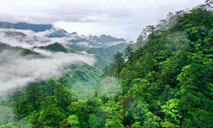One man's contributions to change in China's Tibet
BEIJING, May 26 (Xinhua) -- In 1979, Li Chunmin spent six days on bumpy, muddy roads suffering from severe headaches before reaching southwest China's Tibet Autonomous Region, a place about 3,000 km away from his hometown in north China's Tianjin Municipality.
Since then, he has visited Tibet 20 times as a part of government efforts to bring officials to Tibet to help with local development.
Now 70, the retired Li has witnessed decades of huge changes in Tibet, which marks the 70th anniversary of its peaceful liberation this year.
"I hope to visit all the places in Tibet for the rest of my life, to see the amazing region," said Li.
The year 1979 was a critical year for Tibet, as more than 3,000 officials from across the country traveled there to aid local development. Li Chunmin was one of them.
Li was an official of Tianjin Dredging Co., Ltd. under the state-owned company China Communications Construction. He applied to go to the county of Riwoqe. Riwoqe means "mountains" in the Tibetan language. It is located in the northeastern part of Tibet.
"As was required, I needed to work there for five years, but my baby was only four months old at that time," Li said. "My wife and my parents were quite supportive, especially my father. He said we should go wherever the motherland needs us."
Li boarded a train from Beijing to Chengdu, capital of southwest China's Sichuan Province, before transferring via a bus, which ran for six days on muddy roads.
For starters, Li had to learn to ride horses, speak the Tibetan language and adapt to the life conditions in Riwoqe, which sits about 4,500 meters above sea level.
"I had to ride a horse to rural areas to promote government policies and conduct surveys about people's lives," Li said. "Some countryside roads were so difficult that I had to ride on the horse for three to four days."
During this time, Li bonded with his one-eyed horse called "Xiala," which means blind in Chinese.
Li also tried to learn the Tibetan language.
"I prepared a little notebook. I used the pinyin phonetic alphabet to mark the pronunciation of the Tibetan language, and I used every second I had to recite sentences," he said.
He gradually grew close with locals after eating, living and laboring in the fields with them. He helped them mow the grass, carry fertilizer and taught them scientific knowledge.
One thing that caused Li issues was not being able to get enough vegetables in his diet.
"The lack of vegetables led to constipation," he said. "In the most severe case, I was stopped up for six days."
Eventually, Li's landlady introduced him to Tibetan medicine that relieved his symptoms.
In 1983, Li suddenly fell severely ill due to overworking, and authorities transported him back to Tianjin for treatment. Thanks to medical efforts, his health recovered.
Almost five years of working and living in Tibet, Li felt a strong attachment. In 1993, he took a trip to Riwoqe.
"I saw a classroom with no windows. The wind was blowing right through the room, and the students were shivering," he said. Li was heartbroken. He gave some money to the school and asked them to repair the windows.
Since then, Li started paying more attention to education in Riwoqe and tried his best to help improve the education conditions there.
In 2006, he visited Riwoqe again and donated 350,000 yuan (54,635 U.S. dollars) with his friends to upgrade local student dorms and teaching facilities. He also launched a foundation to raise money to help impoverished students. To this day, the foundation has raised more than 9 million yuan, of which one million came from Li himself.
Despite having a heart surgery last year, this April Li visited Riwoqe for the 20th time. This time around, he met with experts to find a way to ensure water supply for local solar water heaters.
"Li is a hero for us," said Dong Jianhua from Shanghai. He is currently aiding Tibet and has joined Li in the solar water heater project. "Over the years, he has dedicated himself to helping Tibet selflessly, and he has never changed."
Li's efforts are part of a broader picture, as the government took great efforts to help with Tibet's development.
Over the past 70 years, the central government has introduced many favorable policies for the region, covering tax and finance, infrastructure, industrial development, education, health, cultural preservation and environmental protection.
Last year, Tibet's GDP exceeded 190 billion yuan.
Since its peaceful liberation, the region has gradually established a comprehensive transport network of highways, railways, air routes and pipelines. Highways totaling 118,800 km in length have been built in Tibet.
The region has also made coordinated progress in improving its environment, investing a total of 81.4 billion yuan in the area by the end of last year. In 2020, the forest coverage reached 12.3 percent, and the comprehensive vegetation coverage of natural grassland grew to 47 percent.
In the new era, Tibet is enjoying rapid and sustained growth thanks to social harmony and stability.
"This year is the 70th anniversary of Tibet's peaceful liberation, and I happen to be 70 years old," Li said. "I witnessed many things, including the opening of the Qinghai-Tibet railway."
Li said that he plans to visit more places in Tibet in the future.
"There are many places and many things waiting for me to explore," he said.
Photos
Related Stories
- Photo and art exhibition on Tibet opens in Beijing
- Beijing launches first tourist train to Tibet
- Tibet witnesses historic changes over past seven decades
- Xi Jinping on development of Tibet
- Interview: Inheriting traditional Tibetan culture not only promotes regional revitalization, says Japanese director
Copyright © 2021 People's Daily Online. All Rights Reserved.










